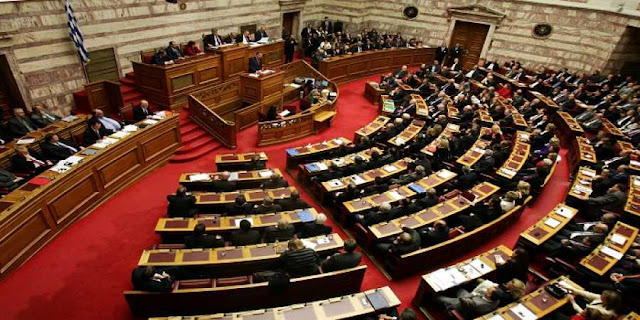Procedures for a vote of confidence in the government were set in motion on Sunday following an announcement by Prime Minister Alexis Tsipras that he will seek to renew Parliament's mandate, so that his government can complete its term with an absolute majority.

The prime minister's announcement came after the Independent Greeks (ANEL) party announced its departure from the ruling coalition.
In the case that his bid is unsuccessful, the constitution dictates that the country must hold snap elections and clearly defines when a government has lost parliament's confidence and can no longer continue to rule.
Even in the case of snap elections, however, the prime minister has laid down a time schedule, saying
that the main criterion for choosing the time of the elections will be the stability of the economy "and not leaving important initiatives that have begun and are underway unfinished."
Among these he included the work underway on revising the constitution, the agreement for Church-State relations, protection of primary residences, rent subsidies, the 120-installment debt settlement schemes and raising the minimum wage.
It should be noted that the committee for revising the constitution concludes its work at the end of January, while the process requires that the plenary hold two votes spaced at least one month apart.
Under article 84 of the constitution, a Greek government can only legitimately govern when it has been given a vote of confidence from the Hellenic Parliament. A vote of confidence can be sought by the government, not the opposition, which only has the right to table a motion of censure in the government once every six months, (or sooner if the motion is signed by an absolute majority of MPs).
The debate on either a vote of confidence or a motion of censure begins two days after it is tabled. A vote of confidence can be passed by a majority of the MPs that are present in Parliament when the vote is held, provided this amounts to at least 120 votes (or two fifths of Parliament). In the case that it passes with less than an absolute majority of 151 MPs, the resulting government has a "vote of tolerance".
A censure motion, by contrast, can only be passed by an absolute majority of 151 MPs.
Based on article 141 of the rules of parliament, meanwhile, it is always a roll-call vote.
In an interview with Open TV on Wednesday, Tsipras said that he would not consent to govern without an absolute majority, even though the constitution permits him to do so.
"I will not have a constitutional problem but clearly there will be a political problem," he said, adding that if he fails to muster 151 votes to support his government "I will proceed in due course and in an absolutely organised fashion to an early resort to the polls."

The prime minister's announcement came after the Independent Greeks (ANEL) party announced its departure from the ruling coalition.
In the case that his bid is unsuccessful, the constitution dictates that the country must hold snap elections and clearly defines when a government has lost parliament's confidence and can no longer continue to rule.
Even in the case of snap elections, however, the prime minister has laid down a time schedule, saying
that the main criterion for choosing the time of the elections will be the stability of the economy "and not leaving important initiatives that have begun and are underway unfinished."
Among these he included the work underway on revising the constitution, the agreement for Church-State relations, protection of primary residences, rent subsidies, the 120-installment debt settlement schemes and raising the minimum wage.
It should be noted that the committee for revising the constitution concludes its work at the end of January, while the process requires that the plenary hold two votes spaced at least one month apart.
Under article 84 of the constitution, a Greek government can only legitimately govern when it has been given a vote of confidence from the Hellenic Parliament. A vote of confidence can be sought by the government, not the opposition, which only has the right to table a motion of censure in the government once every six months, (or sooner if the motion is signed by an absolute majority of MPs).
The debate on either a vote of confidence or a motion of censure begins two days after it is tabled. A vote of confidence can be passed by a majority of the MPs that are present in Parliament when the vote is held, provided this amounts to at least 120 votes (or two fifths of Parliament). In the case that it passes with less than an absolute majority of 151 MPs, the resulting government has a "vote of tolerance".
A censure motion, by contrast, can only be passed by an absolute majority of 151 MPs.
Based on article 141 of the rules of parliament, meanwhile, it is always a roll-call vote.
In an interview with Open TV on Wednesday, Tsipras said that he would not consent to govern without an absolute majority, even though the constitution permits him to do so.
"I will not have a constitutional problem but clearly there will be a political problem," he said, adding that if he fails to muster 151 votes to support his government "I will proceed in due course and in an absolutely organised fashion to an early resort to the polls."
